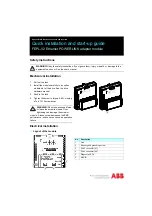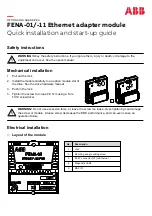
58
NFS2-640/E Operations Manual —
P/N 52743:F1 06/16/2011
Appendix B: Intelligent Detector Functions
Descriptions for Intelligent Detector Functions
NOTE:
For instructions on selecting Intelligent Detector Functions, refer to the
NFS2-640
Programming Manual
.
Function
Description
Analog Display
The control panel reads and displays analog information from the 318
analog detectors (159 per SLC). The display shows the sensed air at
the detector as a percentage of the alarm threshold for each detector.
Sensitivity Adjust
Nine selections for manually setting intelligent detector alarm levels
within the UL range.
If using ionization detectors in duct applications,
set Sensitivity Adjust to Level 1.
Refer to the
NFS2-640 Programming Manual
for detector sensitivity
information.
Day/Night Sensitivity
Operation
You can program the system to automatically force smoke detectors to
minimum sensitivity during the day. Refer to “Time, Date, and Holiday
Functions” on page 52.
Maintenance Alert
When compensation reaches the limit of the amount of drift
compensation that can be safely applied, the control panel reports a
trouble condition, according to National Fire Alarm Code standards.
This condition also activates if the detector remains at very high or very
low measured air levels for an extended time.
Automatic Test
Operation
The control panel performs an automatic test of each detector every
320 minutes. Failure to meet the test limits causes an Auto Test Fail
trouble.
Type Code
Supervision
The control panel monitors hardware device Type Codes for each
installed device at regular intervals (an interval can take up to 40
minutes for a full capacity system). If a mismatch of type compared to
the program occurs, the control panel generates a point trouble labeled
Invalid Type.
LED Control
Operation
A global program selection to prevent detector LEDs from blinking as a
result of polling during normal operation. A typical application is a
sleeping area where a blinking light can distract people. As a standard
function, independent of this programming selection, the control panel
allows all LEDs to turn on in alarm.
Alarm Verification Timer
and Verification Counter
Operation
The control panel performs alarm verification on programmed
intelligent smoke detectors. The Alarm Verification Timer is a global
program selection of 0–60 seconds (ULC installations can not exceed
30 seconds). Each detector includes a Verification Counter, which
displays the number of times that a detector entered verification but did
not time-out to alarm. The Verification Counter increments to 99 and
holds.
Table B.1 Intelligent Detector Functions
















































